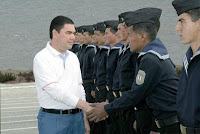
Turkmenistan, the Caspian's most cautious and least well-defended state, has announced plans to boost its navy and patrol its maritime borders as questions loom over the future of the Caspian sea.
Speaking at a naval shipyard where two new missile patrol boats have recently been delivered, President Gurbanguly Berdimuhamedov said that Turkmenistan “needs ships to patrol its maritime borders, to maintain their security and counter negative phenomena and modern challenges”, while stressing that Turkmenistan's naval doctrine was purely defensive in nature.
Although Turkmenistan's naval capabilities are weak and its political will doubtful, Berdimuhamedov's speech was a clear statement that the country is keen to defend its waters amid growing tension over the division of the Caspian.
The EU's decision to open negotiations with Turkmenistan and Azerbaijan on a Trans-Caspian Pipeline (TCP) last month, to bring Central Asian gas west to Europe, has been strongly opposed by Russia and Iran. The Caspian's two strongest states argue that a TCP would cause serious environmental damage and cannot be agreed without the consent of all five littoral countries.
Their real objection, however, is that a TCP would permit an avenue for Central Asian gas to reach Europe without crossing their territory, weakening their regional influence.
In addition, the status of Caspian borders remains contested while the littoral states debate how large a share each should take. This has not stopped exploration of oil and gas deposits, but it has created zones of uncertainty. A recent Wikileaks cable revealed that in 2009, Iran moved an oil rig into disputed waters between it and Azerbaijan, prompting fears of conflict in Baku. Turkmenistan also fears Iranian intimidation.
The country's naval forces are ill-equipped to patrol its borders or defend its territory. It has a handful of rusting Soviet patrol boats operating from dilapidated facilities. The government has been busy purchasing more, however, including some from Ukraine and others from Russia and Turkey. The new missile patrol boats inspected by Berdimuhamedov were built by a joint Russian-Turkmen venture, with most of the work done by Russian firms.
Although the government wants the new navy to be completed by 2015, along with port facilities and a naval academy, Turkmenistan will continue to lag behind its neighbours. Its stated intention to patrol its borders, however, suggests that it is taking its position in the Caspian very seriously.
Sources; Turkmenistan.ru, Eurasianet

No comments:
Post a Comment